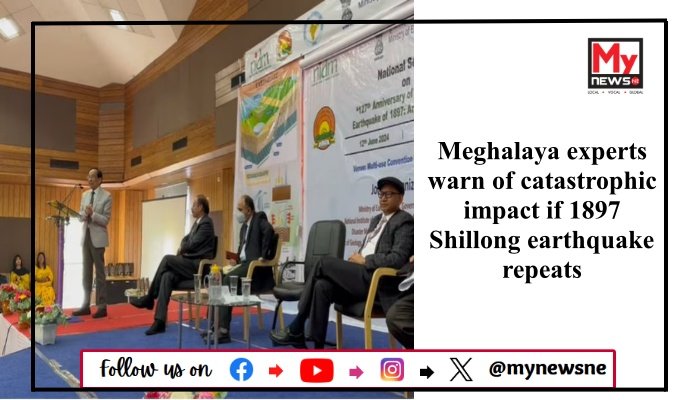Meghalaya: Seminar Highlights Preparedness for Earthquakes on 127th Anniversary of Great Shillong Earthquake
Northeast Desk, 13th June: A seminar titled “127th Anniversary of the Great Shillong Earthquake of 1897: Are we prepared?” was held at the North-Eastern Hill University (NEHU) on June 12, emphasizing the potentially catastrophic consequences if a similar earthquake were to strike the region today.
Prof. Devesh Walia from NEHU’s School of Human and Environmental Science warned that a repeat of the 8.7 magnitude earthquake at midnight could result in at least 500,000 fatalities, given the current population density and vulnerabilities.
The Great Shillong Earthquake of 1897, which occurred at 5:11 pm, was notable for being the first recorded earthquake to break the Earth’s crust surface, causing significant landscape changes and resulting in 1,542 deaths despite many people being outdoors.
Although such high-magnitude earthquakes are rare, experts at the seminar stressed the importance of preparedness to minimize devastation. Walia highlighted ongoing efforts by seismologists to improve earthquake prediction and the need for constructing buildings that adhere to seismic codes.
Seismologists, geologists, and disaster management experts discussed post-earthquake management, including disaster response plans, seismic hazard assessment, early warning systems, and community preparedness. They underscored the urgency of raising awareness and implementing mitigation measures to protect lives and reduce the impact of future earthquakes.
Padmashri Prof. Harsh K Gupta, former Director of NGRI and President of the Geological Society of India, served as the Chief Guest. He acknowledged the inevitability of earthquakes but emphasized the effectiveness of mitigation and safety measures, urging the adoption of practices from earthquake-prone countries like Japan. Gupta also proposed observing June 12 as National Earthquake Day to promote awareness and preparedness.
GK Kesari, ADG & HoD of the Geological Survey of India’s North-Eastern Region, delivered the inaugural address as the Guest of Honour. He highlighted the seismic risks in Zone V and proposed strategies to enhance resilience against earthquakes.
Dr. OP Mishra, Advisor and Director of the National Centre for Seismology, discussed the unpredictable nature of earthquakes and the necessity for resilient infrastructure to mitigate risks from population growth and industrialization.
The seminar included a cultural dance performance and an educational skit on earthquake safety by NEHU’s Department of Geology. A Geo-exhibition displayed various rocks, fossils, and space technology models, offering participants insights from experts.
The event concluded with the announcement of four participants selected to represent India at the International Earth Science Olympiad (IESO) 2024 in Beijing, China, following a rigorous training camp.
Commemorating the 127th anniversary of the Great Shillong Earthquake, the seminar served as a poignant reminder of the region’s seismic vulnerability and the critical need for proactive disaster risk reduction strategies.
Read More: Meghalaya Legislator Files Corruption Complaint Against Former Officials Over Saubhagya Scheme

